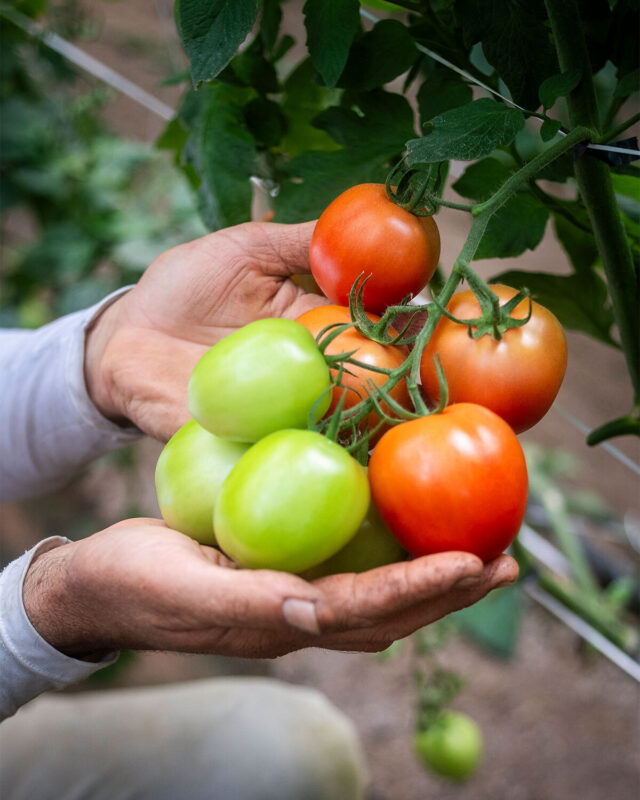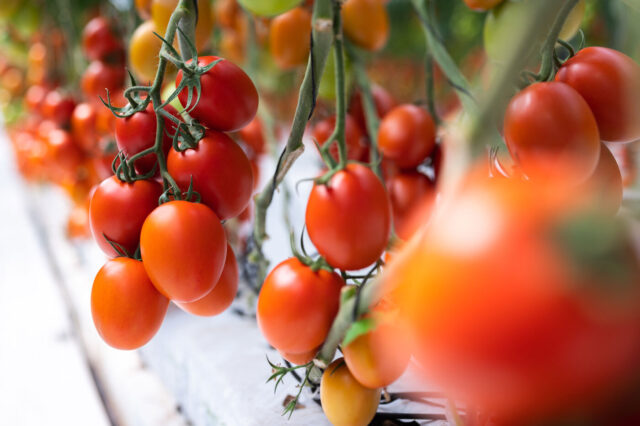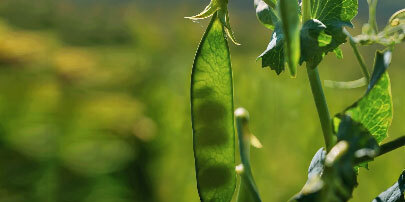Many shades of red – with many demands
Tomatoes that defy viruses
KWS entered the vegetable seed market in 2019 – a big step that shows great foresight. Our breeding program focuses on nine different crops, one of which is the tomato: versatile, demanding and by far the largest segment in terms of volume. Alongside Italy, a large part of our breeding work takes place in Spain. With the station in Almería, KWS is shaping the future of tomato breeding, combining innovative spirit, powerful networks and a focus on protecting crops from rapidly spreading diseases such as the tomato brown rugose fruit virus (ToBRFV).
“Tomatoes are one of the most important vegetable crops worldwide. They come in a wide range of types, have a huge market volume and are an extremely important part of our diet,” says Samuele Mariani, tomato breeder at KWS, who is responsible for the Italian and Spanish markets in particular. Few other crops require breeders to be so attuned to market demands. The tomato seed market is highly fragmented – from Cherry Round to San Marzano, from export goods to specialties for the fresh produce market. The breeding requirements are correspondingly diverse: Our teams at KWS Vegetables are continuously working to combine appropriate ripeness, color, shape, good taste, and the longest possible shelf life with optimal disease resistance.
With RugosePROTECT, we’re giving our customers an answer to one of the most pressing problems in tomato cultivation.
Daniel Puglisi | Head of Vegetable Breeding in Italy
Strong ToBRFV resistance for the world’s most popular vegetable
Almería offers ideal conditions for growing tomatoes. The favorable climate allows up to three breeding cycles per year, significantly accelerating the development of robust varieties. The Spanish team receives support from its colleagues in the international breeding network, including the molecular biology team in Einbeck, which uses state-of-the-art marker technologies to help identify and cross-breed genetic resistances more quickly.
One example of this close cooperation is the fight against the tomato brown rugose fruit virus (ToBRFV) – an aggressive virus that threatens entire crops worldwide and can already spread via the seed. Symptoms include yellowing and bubbling on the leaves, while the fruit shows brown, shriveled spots, deformities, discoloration, uneven ripening, and reduced size, often rendering it unmarketable. “Our varieties meet different market demands, but rugose resistance is an absolute must-have when we are developing new varieties,” emphasizes Daniel Puglisi, Head of Vegetable Breeding in Italy, who oversees an international team of seven tomato breeders in Brazil, Mexico, Spain, Turkey and Italy.


CAUTION: poisonous!
Did you know?
Tomatoes were long considered poisonous and used only for decorative purposes. Originally from Central and South America, tomatoes were feared in the 16th century because they belonged to the nightshade family. Wealthy people were said to have died from eating them – today we know it was actually their pewter plates, which contained lead, that were to blame. Nowadays, tomatoes are a staple of cuisines around the world. They are considered the most popular vegetable worldwide. Over 190 million tons are harvested and consumed every year. That's about 24 kilograms per person.
Source: The Food and Agriculture Organization, 2023
Robust varieties. Healthier plants. Better yields.
With its RugosePROTECT product line, KWS has now launched its first tomato varieties that are resistant to ToBRFV. These hybrids have been specifically bred to withstand the virus, with the first varieties, such as Cherry Plum and Saladette, already available. Further varieties are currently being developed. “The tomatoes are resistant while retaining their typical traits, such as color, shape and taste,” says a delighted Mariani. Being able to respond quickly and specifically to different market demands is crucial – and a matter of course at KWS Vegetables.
The secret to this success lies in international teams with local roots – like in Spain. “Working in a new, dynamic environment, while drawing on the rich experience of local growers, allows us to think outside the box and do things better,” Puglisi explains. KWS Vegetables has developed rapidly. “We have the opportunity to build structures from the ground up, structures that are efficient and bring real added value to our customers.”
The vision? To make tomato breeding not only more efficient, but also more sustainable – with new taste profiles, resource-efficient cultivation and a clearly defined resistance strategy for healthy plants, higher yields and less pesticide use. The ambition is to become one of the industry’s leading players. “For me, breeding is the perfect blend of structure and creativity,” adds Mariani. “We’re creating something new that’s here to stay – and, if all goes well, something that people will love.”
Under the Spanish sun
Our R&D station in Almería is right in the heart of Europe’s vegetable-growing region. Here, on around 14.5 hectares, we develop high-quality varieties of tomatoes, peppers, melons, cucumbers and watermelons – what we call “fruity crops.” In addition to breeding greenhouses and test fields, the station also offers space for product presentations and close coordination with sales and development. Almería perfectly exemplifies the KWS approach: modern, practice-oriented and globally networked.
Want to know more about fruity crops?
More on this topic here.


















